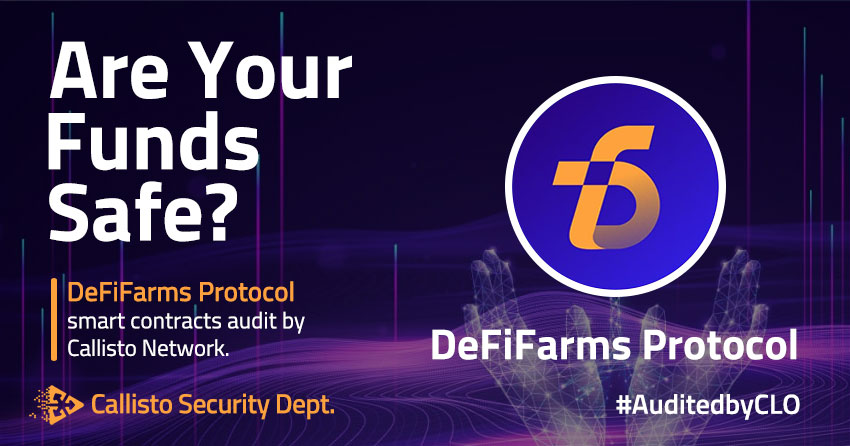DeFiFarms Protocol Token security audit, conducted by the Callisto Network Security Department during August 2021.
DeFiFarms Protocol Security Audit Report
Are Your Funds Safe?
Audit Request
DeFiFarms protocol is the first automatic liquidity acquisition yield farm and AMM decentralized exchange running on Binance Smart Chain with lots of unique and creative features that let you earn and win.
- Website: https://defifarms.org/
- Twitter: https://twitter.com/DeFiFarmsNFTs
- Platform: https://app.defifarms.org/
Source code
https://bscscan.com/address/0x08d1Ed0e3816183e703a492dDD28d68fcc13bb61#code
Disclosure policy
Platform
BSC.
1. In scope
-
-
Upgradable proxy contract:
https://bscscan.com/address/0x08d1Ed0e3816183e703a492dDD28d68fcc13bb61#code - Implementation contract:
https://bscscan.com/address/0xd023618fa3d91f7862d277d59f2e8ad560df01fc#code
-
2. Findings
In total, 0 issue were reported including:
- 0 high severity issue.
- 0 medium severity issue.
- 1 low severity issue.
In total, 11 notes were reported, including:
- 2 notes.
- 9 owner privileges.
No critical security issues were found.
2.1 Unused require
Severity: Note.
Description:
In the function _transfer() in the DefiFarmToken.sol there are two requires conditions which couldn’t be true, because it already checks in the SafeMath library:
- https://bscscan.com/address/0xd023618fa3d91f7862d277d59f2e8ad560df01fc#code#F1#L129
- https://bscscan.com/address/0xd023618fa3d91f7862d277d59f2e8ad560df01fc#code#F1#L133
2.2 There is no function to rescue BNB from the contract address
Severity: Note.
Description:
Since the contract can accept BNB payment, somebody can transfer BNB to its address by mistake.
A good security practice is to allow the owner to rescue BNB from the contract. It will not hurt the users because the contract should not hold BNB.
2.3 Owner privileges
Severity: owner privileges
Description:
The contract owner can:
- Mint any amount of tokens to any address;
- Upgrade contract code. A new contract may be non-audited and has functions dangerous for users.
2.4 Operator privileges
Severity: owner privileges
Description:
The contract’s operator has the right to:
-
- Update transfer tax rate;
- Update burn rate;
- Update max transfer amount rate;
- Update min amount to liquify;
- Set/remove excluded addresses from AntiWhale list;
- Enable/disable the
Swap And Liquifyfunction; - Update the swap router that is using in the
Swap And Liquifyfunction.
3. Security practice
- Open-source contact.
- The contract should pass a bug bounty after the completion of the security audit.
- Public testing.
- Automated anomaly detection systems. – NOT IMPLEMENTED. A simple anomaly detection algorithm is recommended to be implemented to detect behavior that is atypical compared to normal for this contract. For instance, the contract must halt deposits in case a large amount is being withdrawn in a short period of time until the owner or the community of the contract approves further operations.
- Multisig owner account.
- Standard ERC20-related issues. – NOT IMPLEMENTED. It is known that every contract can potentially receive an unintended ERC20-token deposit without the ability to reject it even if the contract is not intended to receive or hold tokens. As a result, it is recommended to implement a function that will allow extracting any arbitrary number of tokens from the contract.
- Crosschain address collisions. ETH, ETC, CLO, etc. It is possible that a transaction can be sent to the address of your contract at another chain (as a result of a user mistake or some software fault). It is recommended that you deploy a “mock contract” that would allow you to withdraw any tokens from that address or prevent any funds deposits. Note that you can reject transactions of native token deposited, but you can not reject the deposits of ERC20 tokens. You can use this source code as a mock contract: extractor contract source code. The address of a new contract deployed using
CREATE (0xf0)opcode is assigned following this schemekeccak256(rlp([sender, nonce])). Therefore you need to use the same address that was originally used at the main chain to deploy the mock contract at a transaction with thenoncethat matches that on the original chain. Example: If you have deployed your main contract with address 0x010101 at your 2021th transaction then you need to increase your nonce of 0x010101 address to 2020 at the chain where your mock contract will be deployed. Then you can deploy your mock contract with your 2021th transaction, and it will receive the same address as your mainnet contract.
4. Conclusion
The audited smart contract can be deployed. No security issues were found during the audit. Users have to pay attention to the owner’s right to upgrade the contract on another which was not audited and may contain dangerous functionality.
It is recommended to adhere to the security practices described in pt. 4 of this report to ensure the contract’s operability and prevent any issues that are not directly related to the code of this smart contract.
Appendix
Smart Contract Audits by Callisto Network.
Miscellaneous
Our Most Popular Audit Reports.
Blockchain as Seen by Security Experts.
Follow Callisto’s Security Department on Twitter to get our latest news and updates!

